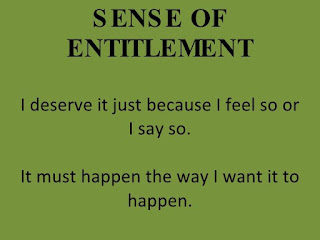Do You Have a Sense of Entitlement Complex?
A sense of Entitlement - An unrealistic, unmerited or inappropriate expectation of favorable living conditions and favorable treatment at the hands of others.
When we were young it was kind of cute when we threw tantrums as toddlers, not getting what we wanted. People would coo at us, maybe even pick us up and hold us, telling us in ooey-gooey tones that “you’ll get it later” or “you’ve got to wait a little while“. Then our tears would be mopped up, our snotty little noses would be wiped, and we’d be placed gently on the ground again.
As we grew older, some of us would learn to wait our turn, be patient and show consideration for others. Some of us, however, didn’t. We’d continue throwing tantrums but in more mature and sophisticated ways. We’d continue to demand our fair share from others, but more subtly, and often without screaming or rolling around on the floor crying. And last, of all, we’d continue to expect special treatment just because … well, just because we’re us and it’s because what we deserve. Naturally.
Well here’s the thing … you’re not so special.
What Entitlement looks like
ME! ME! ME!
A mother feeds herself while letting her children go hungry.
A spouse frequently spends money from the joint account on luxury items.
A teenager defiantly uses drugs and expects his parents to bail him out when he gets caught.
A woman shows up at a function or party she has not been invited to.
A middle-aged man makes no attempt to save for his retirement, assuming his family will pay for everything.
An irate customer demands products and services that they have not paid for.
An angry parent wants a school to make impractical concessions or arrangements for their child.
Well here’s the thing … you’re not so special.
When you’re in a relationship with someone with a sense of entitlement, it can look and feel like they are incredibly selfish. They may prioritize trivial comforts and pleasures for themselves over basic needs that you have, like balancing the budget, putting food on the table, paying the rent, getting enough sleep, keeping up with work commitments etc. Your own desires and interests will often be relegated to the bottom of the pile.
This can leave you feeling taken for granted, devalued, angry, resentful and taken advantage of. Your frustration is may come out in all sorts of negative ways including sarcasm, skepticism, name-calling, anger, and depression. You may intermittently become angry and rant, then disconnect or give in just to end the drama.
How to cope with a Sense of Entitlement
What NOT to do
Don’t give in to unrealistic demands just to keep the peace.
Don’t expect a personality-disordered person to reciprocate favorable treatment you show them.
Don’t try to use logic to argue your way out of it. That will only be interpreted as invalidating their feelings and result in a Circular Conversation.
Don’t stay in any situation or room where your basic needs such as food, sleep, shelter, medical attention, supportive relationships and safety from violence are threatened or withheld.
Don’t feel rushed into making or denying commitments or decisions. It’s OK to say “I’ll have to think about it”.
Don’t fall into black and white thinking. People with a sense of entitlement also have some legitimate needs and concerns.
What TO do
Recognize the characteristics of a sense of entitlement and understand where it comes from.
Accept that you are not going to be able to meet all of the needs of any person. That is especially true in the case of people who have a Personality Disorder. Acknowledge the good you do, without beating up on yourself for having sensible limits.
Take care of your own needs as well as the needs of others. It is just common sense to establish patterns and choices that are healthy in the long run.
Talk to others whom you trust about what is being asked before saying “yes” or “no”.
When we were young it was kind of cute when we threw tantrums as toddlers, not getting what we wanted. People would coo at us, maybe even pick us up and hold us, telling us in ooey-gooey tones that “you’ll get it later” or “you’ve got to wait a little while“. Then our tears would be mopped up, our snotty little noses would be wiped, and we’d be placed gently on the ground again.
As we grew older, some of us would learn to wait our turn, be patient and show consideration for others. Some of us, however, didn’t. We’d continue throwing tantrums but in more mature and sophisticated ways. We’d continue to demand our fair share from others, but more subtly, and often without screaming or rolling around on the floor crying. And last, of all, we’d continue to expect special treatment just because … well, just because we’re us and it’s because what we deserve. Naturally.
Well here’s the thing … you’re not so special.
What Entitlement looks like
ME! ME! ME!
A mother feeds herself while letting her children go hungry.
A spouse frequently spends money from the joint account on luxury items.
A teenager defiantly uses drugs and expects his parents to bail him out when he gets caught.
A woman shows up at a function or party she has not been invited to.
A middle-aged man makes no attempt to save for his retirement, assuming his family will pay for everything.
An irate customer demands products and services that they have not paid for.
An angry parent wants a school to make impractical concessions or arrangements for their child.
Well here’s the thing … you’re not so special.
When you’re in a relationship with someone with a sense of entitlement, it can look and feel like they are incredibly selfish. They may prioritize trivial comforts and pleasures for themselves over basic needs that you have, like balancing the budget, putting food on the table, paying the rent, getting enough sleep, keeping up with work commitments etc. Your own desires and interests will often be relegated to the bottom of the pile.
This can leave you feeling taken for granted, devalued, angry, resentful and taken advantage of. Your frustration is may come out in all sorts of negative ways including sarcasm, skepticism, name-calling, anger, and depression. You may intermittently become angry and rant, then disconnect or give in just to end the drama.
How to cope with a Sense of Entitlement
What NOT to do
Don’t give in to unrealistic demands just to keep the peace.
Don’t expect a personality-disordered person to reciprocate favorable treatment you show them.
Don’t try to use logic to argue your way out of it. That will only be interpreted as invalidating their feelings and result in a Circular Conversation.
Don’t stay in any situation or room where your basic needs such as food, sleep, shelter, medical attention, supportive relationships and safety from violence are threatened or withheld.
Don’t feel rushed into making or denying commitments or decisions. It’s OK to say “I’ll have to think about it”.
Don’t fall into black and white thinking. People with a sense of entitlement also have some legitimate needs and concerns.
What TO do
Recognize the characteristics of a sense of entitlement and understand where it comes from.
Accept that you are not going to be able to meet all of the needs of any person. That is especially true in the case of people who have a Personality Disorder. Acknowledge the good you do, without beating up on yourself for having sensible limits.
Take care of your own needs as well as the needs of others. It is just common sense to establish patterns and choices that are healthy in the long run.
Talk to others whom you trust about what is being asked before saying “yes” or “no”.



Comments
Post a Comment